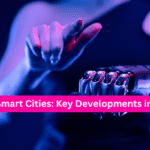Artificial Intelligence (AI) is no longer a futuristic concept; it has rapidly become an integral part of our everyday lives. From voice assistants like Siri and Alexa to advanced machine learning algorithms driving recommendations on platforms like Netflix and YouTube, AI is revolutionizing industries, transforming economies, and reshaping our digital landscape. But what lies ahead for AI by 2025?
As we move closer to this pivotal year, the future of AI is both exciting and unpredictable. With exponential advancements in processing power, data analysis, and neural networks, the potential for AI to change the way we live, work, and interact with the world is vast.
The Evolution of AI: From 2020 to 2025
To understand what 2025 holds for Artificial Intelligence, it’s essential to look back at its recent evolution. Over the past decade, AI has made significant strides in various fields:
- Healthcare: AI-driven diagnostics, personalized treatments, and predictive healthcare models have dramatically improved patient care.
- Business: Automation, AI-powered customer service, and data-driven decision-making have helped businesses increase productivity and optimize workflows.
- Education: AI has been a valuable tool in personalizing learning experiences and providing virtual teaching assistants.
- Autonomous Vehicles: The push towards self-driving cars has seen remarkable progress, though full autonomy is still a few years away.
By 2025, AI is expected to build on these foundations, with even greater sophistication and capabilities across various sectors.
AI in 2025: Key Trends to Watch
1. Increased Integration in Everyday Life
AI will continue to infiltrate daily life, becoming more embedded in everything from smart homes to urban planning. Virtual assistants like Alexa, Google Assistant, and Apple’s Siri will become more intuitive, understanding context, emotions, and user preferences. These AI systems will handle tasks like managing schedules, making purchases, and even controlling home devices with natural language.
In 2025, personalized AI assistants will be a common feature of the digital landscape. They’ll not only manage daily activities but also offer proactive solutions, anticipating needs before they arise.
2. AI in Healthcare: Smarter Diagnostics and Personalized Medicine
One of the most significant transformations AI will bring is in the healthcare industry. By 2025, AI will play an even more prominent role in diagnostics, leveraging vast amounts of medical data to predict diseases earlier and recommend personalized treatments. AI algorithms will analyze medical images, DNA data, and patient histories to offer highly accurate diagnostic insights.
Moreover, AI-powered drug discovery will accelerate, reducing the time it takes to develop new treatments and vaccines. Personalized medicine will become a reality, with AI-driven platforms creating individualized healthcare plans based on a person’s unique genetics and health history.
3. The Rise of Autonomous Vehicles
While self-driving cars are already on the road, the next major milestone will come in 2025 when we could see autonomous vehicles becoming a common sight in major cities. AI will continue to enhance vehicle safety, traffic management, and navigation systems, making fully autonomous driving not just feasible, but a widespread option for consumers.
This transition will also lead to the growth of autonomous delivery systems, including drones and robotic couriers, revolutionizing the logistics industry.
4. AI in Creative Industries: Art, Music, and Media
In the creative industries, AI will be used to enhance the artistic process rather than replace it. By 2025, AI will be capable of creating high-quality artwork, music, and literature. AI-generated art will no longer be seen as a novelty; instead, it will be viewed as a legitimate form of creative expression.
Music composition and video editing tools powered by AI will enable artists to push boundaries and explore new forms of creative expression. Even filmmakers and writers will leverage AI to improve storylines, generate scripts, and develop characters with more depth.
5. The Future of AI in Business and Workplaces
The workplace of 2025 will look vastly different, with AI transforming how we work. Automation powered by AI will streamline operations in industries like manufacturing, logistics, and finance, significantly reducing human error and operational costs.
AI-enhanced work environments will improve efficiency by supporting employees with tools for decision-making, collaboration, and project management. In customer service, AI-powered chatbots and virtual assistants will handle everything from simple queries to complex support tasks.
While AI will enhance many jobs, it will also create new roles and job categories focused on AI development, programming, and maintenance.
The Ethical and Societal Impact of AI by 2025
While the advancements in AI present numerous benefits, they also raise several ethical concerns. Issues such as data privacy, AI bias, job displacement, and accountability for AI decisions will become central topics of discussion.
Governments and organizations will need to establish strong ethical guidelines and regulations to ensure that AI is developed and deployed responsibly. In 2025, expect to see more robust discussions and frameworks surrounding the regulation of AI in industries such as healthcare, finance, and autonomous vehicles.
Additionally, the conversation about AI and job displacement will intensify. While automation will create new opportunities, it will also displace certain manual and repetitive jobs. Governments will need to invest in retraining and reskilling programs to help workers transition into new roles in the AI-powered economy.
Conclusion: The Promising Horizon of AI in 2025
The future of Artificial Intelligence by 2025 promises to be a game-changer for industries, governments, and individuals. While the opportunities for AI to improve lives are immense, careful planning, ethical considerations, and a focus on inclusivity will be key to maximizing its benefits.
As we approach 2025, AI will not just be a tool—it will become a cornerstone of how we live, work, and interact with the world. Its transformative power is undeniable, but only through responsible and thoughtful innovation will AI truly reach its full potential.
5 Commonly Asked Questions About AI’s Future in 2025
Q1. How will AI impact jobs in the future?
Answer: AI will significantly alter the job landscape. While certain repetitive and manual tasks may be automated, AI will also create new job opportunities in fields like AI development, data science, cybersecurity, and ethics. Workers will need to adapt by gaining skills in technology, critical thinking, and problem-solving.
Q2. Will AI be able to make human-like decisions by 2025?
Answer: AI is advancing rapidly in decision-making, but it will not fully replicate human emotional intelligence or complex reasoning by 2025. AI will still require human oversight to ensure ethical, moral, and empathetic decision-making.
Q3. How can AI help in healthcare by 2025?
Answer: AI in healthcare will help with more accurate diagnostics, personalized treatment plans, and drug discovery. AI systems will analyze large datasets to predict health risks, identify early-stage diseases, and recommend individualized care plans.
Q4. Are self-driving cars expected to be widely used by 2025?
Answer: Yes, by 2025, we expect a significant increase in the use of autonomous vehicles, especially in urban areas. However, challenges remain in terms of regulations, public acceptance, and the integration of self-driving cars into existing infrastructure.
Q5. How will AI improve our daily lives in 2025?
Answer: AI will make daily life more efficient through smarter personal assistants, autonomous systems for transportation and logistics, and AI-driven services in healthcare, education, and business. Tasks that require human intervention today will be handled autonomously by AI, freeing up time for people to focus on more complex activities.











